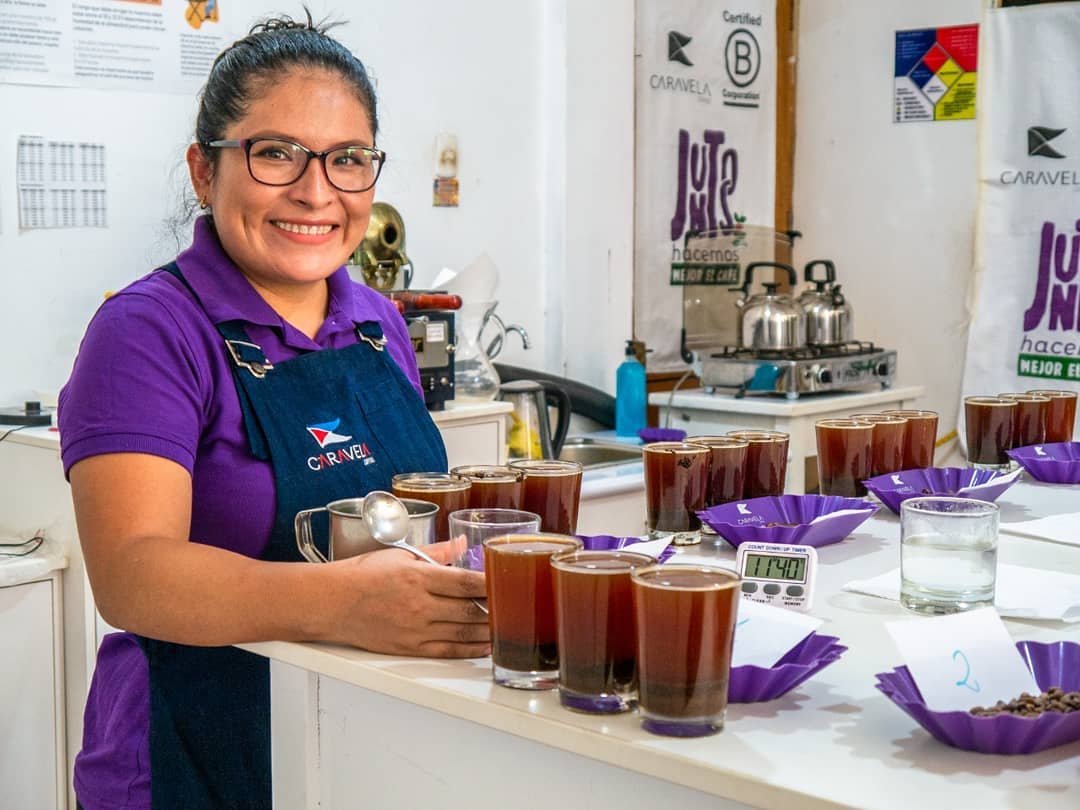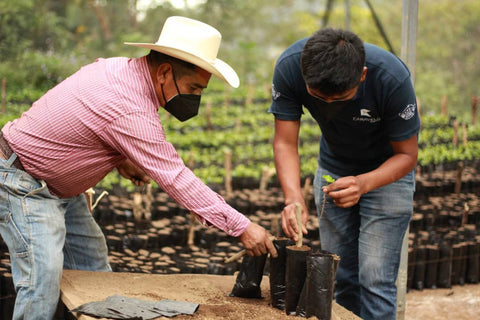Join us for a short conversation with Alejandro Cadeña, the CEO and co-founder of Caravela, and a proud partner of Standart Issue 23.
Alejandro, should we be looking at coffees roasted in producing countries? How viable is it, and will we be seeing more of it?
Definitely! Coffee roasted in the country of its origin is a growing market, one which we believe will become even more important in the next decade. Loads of coffee shops and roasteries have opened in producing countries, and their customers have nothing to envy in their counterparts in traditional consumer markets.
'I would like to see coffee roasted at origin continue to grow along with the demand for quality coffee, which helps to lift coffee prices and create more value at origin in an industry that has traditionally created value at the consumer end of the chain.'
Indeed, many of these business are more easily able to focus on direct relationships with growers and minimise the distance between grower and consumer, working to break down the producer–consumer dichotomy that has predominated in consuming countries for decades. In sourcing the best coffees from in-country, these businesses allow for more interface between farmers and consumers, in turn allowing farmers to more accurately price their offerings and sell at more realistic and competitive prices than they typically would to exporters.

This results in the local roasteries being able sometimes to pay more than foreign buyers and therefore source extremely good coffees for local consumption. But the critical benefit here is that roasters are able to deliver freshly roasted coffee direct to consumers in five to seven days at competitive prices, breaking perhaps the biggest handicap that origin-based roasters have had to grapple with when compared to roasters based in consuming countries.
There are even a handful of Latin American coffee growers who have launched websites that cater to consumers abroad, often roasting and packaging their coffees out of their homes. Even we are selling green coffee to a handful of roasters in Colombia who need more volume. I would like to see coffee roasted at origin continue to grow along with the demand for quality coffee, which helps to lift coffee prices and create more value at origin in an industry that has traditionally created value at the consumer end of the chain.
Would you briefly take us through a specific example or case study of the sort of work done through your PECA Programme, and how it is funded?
Our PECA Programme is the backbone of our operation. It is the work on the ground with producers that is essential in our continuing to source great coffee for years to come. The programme was created in 2011, and it is funded by the roasters that source coffee through us, and who see the programme as representing value for them too.
PECA focuses on educating the coffee growers with whom we work in three main areas: farm management, cup quality, and sustainability. We have a team of more than 40 educators that continuously visit producers to provide education and training to them and their families on topics such as best practices for increasing productivity, pest and disease management, and how to improve the cup quality of their coffee. The goal is to generate knowledge and build resilience in our supply chain by making these businesses more profitable for producers. Because the advisory and training offered by our PECA team are personalized, we can track progress on a case-by-case basis and ensure producers are benefitting.

Carlos Arturo from Huila, Colombia, member of the PECA programme
Coffee growers who work with Caravela know that the better the coffee they produce, the higher the prices they will receive. And this extra income allows for much more flexibility in reinvesting in farms and families. Moreover, our PECA team works with roasters and producers to develop projects that benefit both sides in unique ways, leading to greater value for everyone. For example, last year we completed a project with North Star from Leeds, the UK that helped a producer in Chalatenango, El Salvador improve her drying and wet milling infrastructure, as well as implementing a water treatment system to reduce the contamination caused during the fermentation process.
Most importantly, we are seeing quality improve over time. Farmer Daniel Rodrigues from Nicaragua says, ‘Since PECA started visiting us, we have been improving our production with the technical assistance received and we are very thankful.’ Another farmer from Nicaragua, Donald Efrain Roque, says that ‘Caravela’s advice has been very valuable because I have learned something new. Not only me, but the workers on my farm have also learned how to work with specialty coffee and that is thanks to Caravela. PECA comes and visits us when we are harvesting, they come and see when we are processing the coffee, they come and see when it's ready to deliver to analyse it, so you are always learning.’
'Women are fundamental in the success and sustainability of coffee across the entire chain.'
Gender equity in coffee has currently been defined by the industry, not by gender experts, and the result is “women’s coffee.” Women’s coffee is loosely defined as being “women grown,” or “women-owned,” or “women-led” coffees…. But, as we know, women make up about half the labour force in coffee, and their labour is often hidden.
Would you tell us a little about your partnership for gender equity, how it works to support and promote all women workers throughout the chain, and why this distinction matters?
Women typically provide between 40 and 80 per cent of the pre and post-harvest labour on coffee farms. As such, they are critical to the quality and yields, and therefore of the profitability of coffee farms. Therefore, the concept of women's coffee should encompass much more than just the ‘ownership’ of the farm. Women are fundamental in the success and sustainability of coffee across the entire chain.

Member of the Caravela PECA team at buying stations Cajamarca and Cusco stations in Peru
When we heard from Kimberly Easson and Greg Meenahan about the Gender Equity Index (GEI), we were very happy to see a project that was interested in developing a holistic framework and strategy to build gender equity capacity from the ground up—not as a separate strategy but weaved into and leveraging the work that companies like Caravela are already doing through their extension and advisory teams, in our case the PECA team.
The Project is building a universal tool (an index) that will help us assess the work that we are doing with farmers, proposing recommendations and resources to achieve gender equity best practices. The ultimate goal of the GEI is to overcome the gender barriers related to technology and skill transfer at origin regarding good agricultural practices (GAP) training, renovation, post-harvest processing, financial literacy training, quality assurance training, Q-grading, and other efforts. By tackling these issues on the ground, we will increase the profitability and resilience of producers.
This interview was published in partnership with Caravela.



